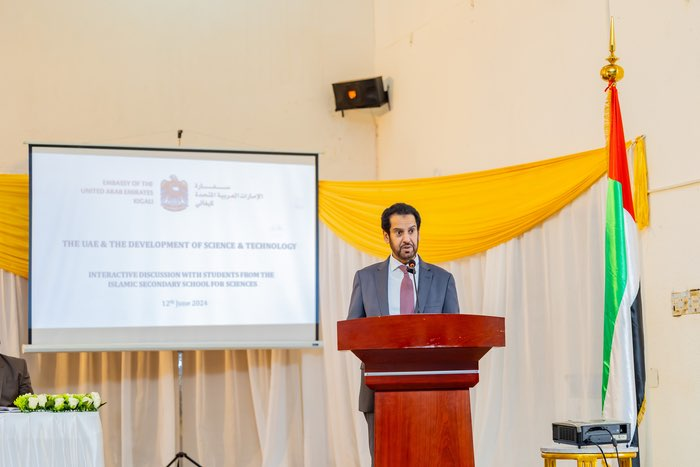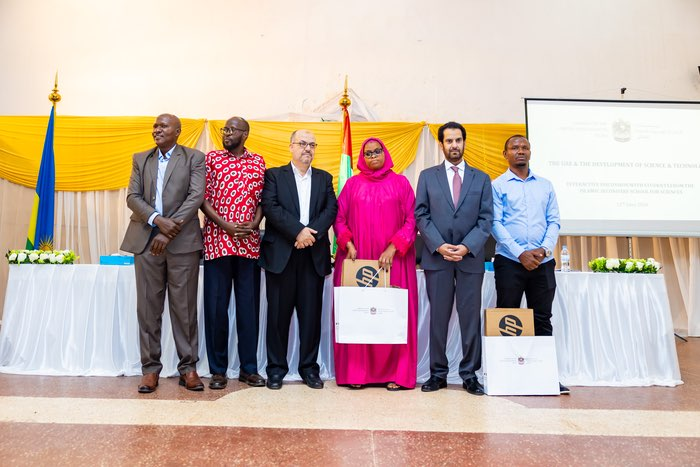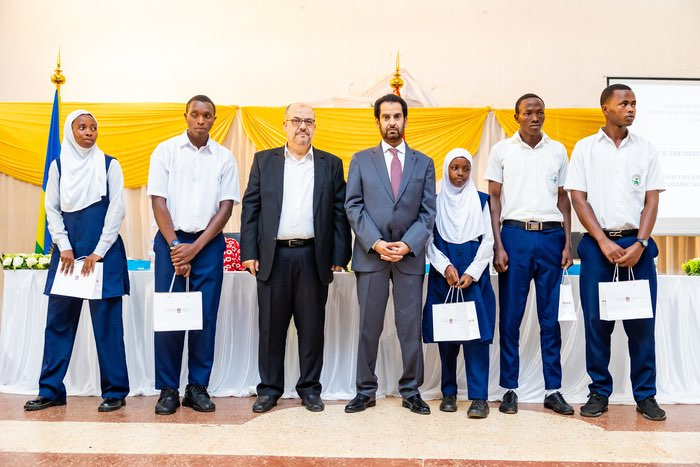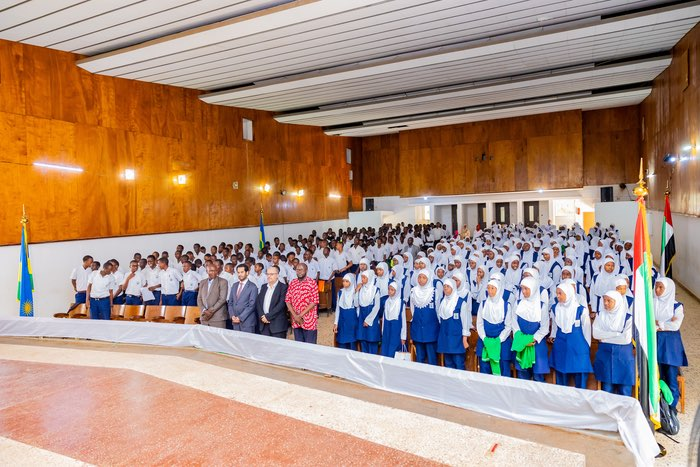
UAE Ambassador to Rwanda, His Excellency Hazza Al Qahtani, exchanging with students
The UAE Ambassador to Rwanda, His Excellency Hazza Al Qahtani, visited the Islamic Scientific Secondary School (ESSI) in Nyamirambo, Kigali, to discuss the development of science and technology in the UAE.
In his speech, H.E Al Qahtani discussed encouraging students to follow science and technology courses and also covered aspects of the UAE’s commitment to science and technological advances. He highlighted that the country recognizes that developing its economy to an advanced stage requires accelerating work on localizing advanced technology, and investing in upskilling national human resources in the field of modern science and technology.

Amb. Hazza Al Qahtani with awarded teachers
Over the past years, the UAE has placed great importance on the localization of technology. The country has focused on acquiring and developing the tools of progress and development through its national workforce, particularly in vital sectors such as renewable energy, nuclear energy, and the space industry.
The UAE also established the UAE Space Agency in 2014, sending the first Arab and Islamic orbiter to Mars, led by an Emirati team on a scientific exploration that reached the Red Planet. The UAE currently has the largest active space sector in the Gulf region and the Middle East.
In 2019, Hazza Al Mansouri became the first Emirati astronaut to reach space and the UAE has also made great strides in the field of nuclear energy, particularly with regards to the Barakah Nuclear Power Plant. The Mohammed bin Rashid Al Maktoum Solar Park, one of the world’s largest renewable projects, is a spread over a total area of 77 km² in Saih Al-Dahal, about 50 km south of Dubai.

Amb. Hazza Al Qahtani with awarded students
The UAE aims to reduce carbon dioxide emissions by around 70%, increase reliance on clean energy by 50%, and enhance energy consumption efficiency by approximately 40% by the middle of the 21st Century.
Science represents one of the UAE’s key strategies for enhancing its global competitiveness in the 21st century. In October 2017, the government launched the UAE Artificial Intelligence Strategy, the first of its kind in the region and the world. The goal is for the UAE government to lead globally in investing in Artificial Intelligence across its vital sectors, utilizing the latest AI technologies and tools, applying them efficiently in various fields of work, and optimally investing all available resources.
In this context, the Mohamed bin Zayed University of Artificial Intelligence was established in October 2019, marking a new phase in the UAE’s journey in science and technology. This university is the first in the world dedicated to specialized postgraduate studies in artificial intelligence research.
Further demonstrating its commitment to science and technology development, the UAE has forged a collaboration with Rwanda through the recent signing of a Memorandum of Understanding between the Rwanda Space Agency and the UAE Space Agency for Civil Space Cooperation for Peaceful Purposes.
.

The Ambassador together with students at the Islamic Scientific Secondary School (ESSI)
The progress made by the UAE in the sectors of renewable energy, nuclear energy, Artificial Intelligence, and space exploration began with investing in science education within schools and developing research institutions.
The Director of ESSI, Abdu Ntamuturano, commended the Ambassador for encouraging students to study more science, so they can be more beneficial to themselves and the country.
“ESSI has 734 students attending secondary education. We appreciate the annual visit of Ambassador Hazza Al Qahtani, who informs our young people about the progress made by his country in science and technology. This encourages our students to choose scientific fields at the university level,” he said.
The Islamic Cultural Center and the ESSI were created in 1985 with the support of Libya and the UAE. The school has already registered 1,609 graduates since its inception, and the support of the two countries is continuing. (End)
